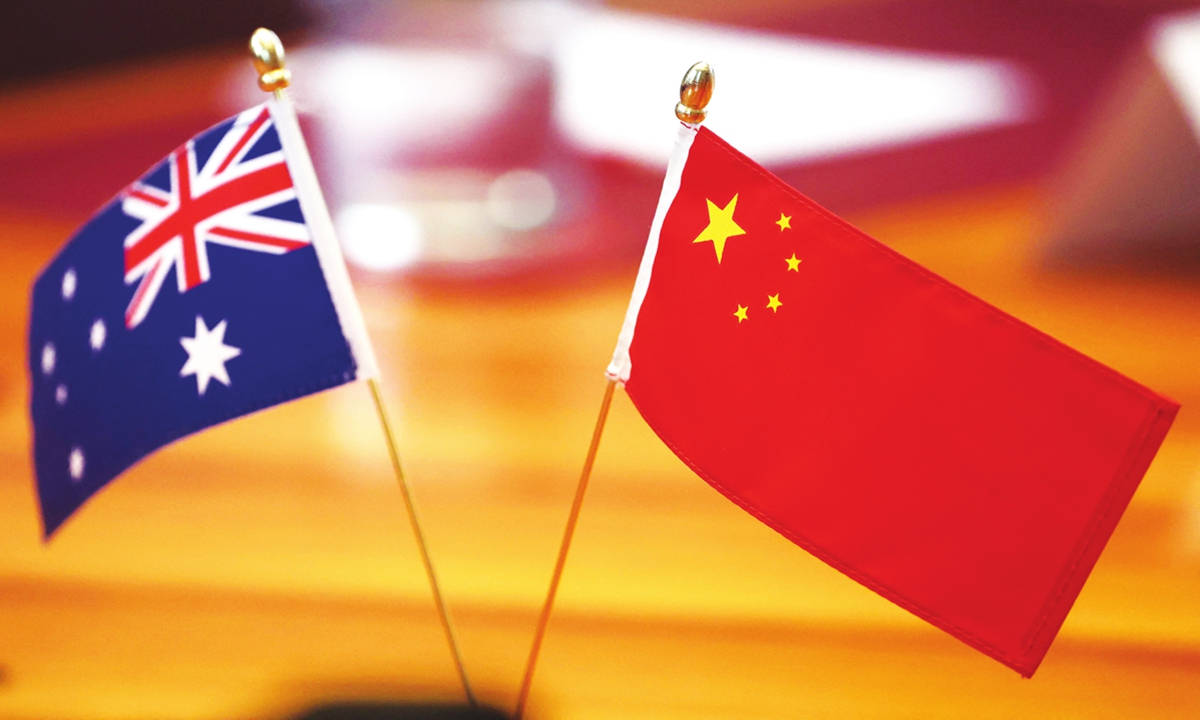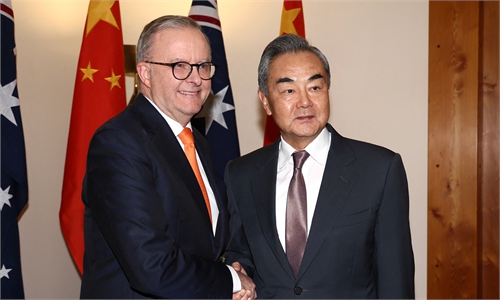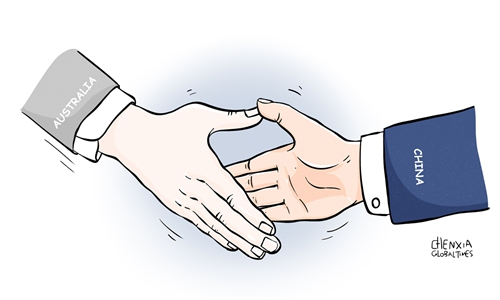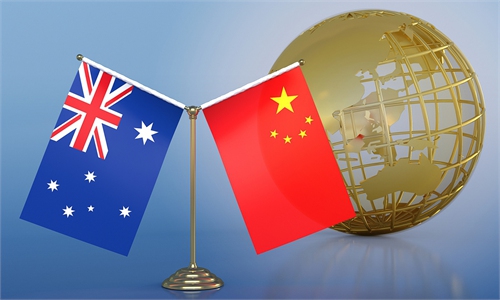'When China and Australia cooperate, they learn to trust each other'

Photo: VCG
Editor's Note:Chinese Foreign Minister Wang Yi concluded his visit to Australia on March 21, with positive signs signaling that healthy bilateral ties are back on track. How can the future China-Australia relationship avoid being defined by differences and disagreements? How will Wang's trip help facilitate exchanges between the two countries? Jocelyn Chey (Chey), former Australian diplomat and Australia's first cultural counselor in China, shared her insights with Global Times (GT) reporters Wang Zixuan and Xing Xiaojing.
GT: Chinese Foreign Minister Wang Yi held the seventh China-Australia Foreign and Strategic Dialogue with Australian Foreign Minister Penny Wong during his trip. In your latest article, you mentioned that "the Wang/Wong meeting will be an opportunity to shape future relations in ways that are beneficial to Australia, or they could put us back in the freezer." After Wang's visit, what's your feeling about the results and impact of this meeting?
Chey: The meeting has been very positive. Any kind of meeting is good when it is held in a cordial atmosphere, and both sides show that they were pleased with the results. It seems to me, as someone who cares very deeply about Australia-China relations, we have made a big step forward with this meeting.
GT: In the meeting with Wang on Wednesday, Australian Prime Minister Anthony Albanese said that "differences and disagreements should not define the Australia-China relations, and both countries should seek common interests as far as possible." How do you think the future China-Australia relationship can avoid being defined by differences and disagreements?
Chey: It's not just about having a good relationship, both sides need to do more. So, our officials on both sides are going to have a lot of work to do in the next few months. It includes trade, defense and consular cases, but more importantly, they're going to talk about some of the big global issues.
The world is in a mess at the moment. I often feel quite depressed, more people are now becoming refugees because of famine and war. While we may have overcome one pandemic, there's always a chance that there could be another outbreak of pandemic. The global economy is not doing well. The United Nations needs some care and attention, which really needs some reform. Also, there are affairs which really need attention in the Middle East, Europe and Africa. There are lots of areas for cooperation. And I think the important thing about the meeting on matters of common concern is that when two sides are cooperating, they learn to trust each other, they learn to work together and that will be the best outcome.
GT: According to the Australian Broadcasting Corporation, Australia's Trade Minister Don Farrell said that he was "not sure" if the US is Australia's most trusted ally. Why does he have this feeling of uncertainty? Does it mean that Australia's trust in the US is declining?
Chey: Very frankly, I think people all around the world, not just in Australia, are really worried about former US president Donald Trump being reelected. Last time when Trump was president, he was very unpredictable, nobody could tell exactly what his policies were going to be. It's very difficult to trust someone if you can't predict what they're going to do. The US is a very important ally for Australia, we can't deny that. But that's one thing, and Donald Trump is something else.
Also, more regional cooperative arrangements are always good, but they should be open. They should be not just a closed group that only certain countries are allowed in, such as AUKUS. There's been quite a lot of discussion in the Australian community, not just in the press, but among scholars about what exactly is the purpose of our AUKUS treaty.
Those people who have been raising problems with it have got much more specific concerns, while those people who say AUKUS is very important just talk in generalities. They don't tell you exactly why it's important or what it's supposed to do. But I think the reason for that is certainly because the two pillars of AUKUS.
The first pillar is nuclear submarines, nuclear submarines would bring the Australian and the US defense forces together. The second pillar is more general technology cooperation. The second one might be a good idea, but the first one is clearly aimed at containing China. I can't understand why Canada or New Zealand or other countries might want to join it. I think it is what we might call a pipe dream that our previous prime minister had. It might even disappear like smoke someday, because it's not necessarily going to happen.
GT: You have said that if there are security concerns, these should be clearly spelled out and not hidden behind weasel words such as "national interest." Why do some Western countries often use "national interest" as an excuse to contain China?
Chey: Countries' concept of national security is very weak. Who decides what's a national security issue? And how do they reach that decision? I think it would be very helpful if it would be written into the legislation, for instance, to say that our ports are a matter of national security. Then we would know what they're talking about, that's just an example.
Another country might say our telecommunications system is a matter of national security, but in fact, we have several foreign companies who are operating Australian telecommunications. So maybe that's not a matter of national security, who knows? I haven't ever seen a list.
GT: As Australia's first cultural counselor in China, how do you see the role of people-to-people exchanges in China-Australia relations? How will Foreign Minister Wang's visit help facilitate exchanges between the two countries?
Chey: The cultural connections between Australia and China have remained alive during some very difficult years. And that just proves how important they are. When I started this work at the beginning of our diplomatic relations, we realized that Australia and China would have to be much more deeply connected in trade, diplomacy and strategic affairs. But the people of Australia at that time knew very little about China, and I might say the people of China knew even less about Australia.
So we put in quite a lot of work, and we encouraged people and community groups at all levels to make direct contacts with people in China. It's been wonderful to see the results that we have achieved.
When we say culture, it doesn't just mean music, art and literature, it means a lot more than that. All of these have, almost without exception, persisted through many years and have grown. And now they will go on regardless of whether we have good relations at the high level or not. But of course, if we have good relations at a high level, then people on both sides will be more encouraged to engage in people-to-people exchanges.
GT: But you mentioned that the people-to-people exchanges between China and Australia "should not be restricted by overly cautious security measures." What do you mean by saying "overly cautious security measures"? What negative impact have such restrictions brought?
Chey: I have heard particularly from people who were working in science and technology that they really don't understand what are the security issues on both sides. So they're not sure whether their exchanges are permitted by governments on both sides. This is making life quite difficult.
I have been contacted by a number of people who have been affected. I studied Chinese language at university in Australia, so I continue to watch what is happening in the universities' teaching and research in Chinese language and history. In Australia, students are free to study whatever language or culture they wish. But the negative media coverage really affects the students' choices in Australia. Then the number of enrollments and the job opportunities for people who are teaching or researching Chinese language, history and culture are also affected.



